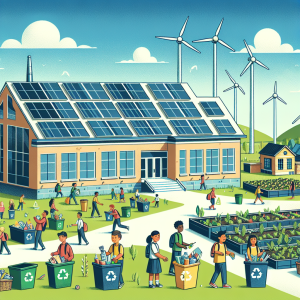Sustainable Fashion: A Guide to Greener Choices
The fashion industry, long criticized for its environmental impact, is evolving to embrace sustainability. With growing awareness and demand from consumers, sustainable fashion is no longer a niche interest but a pivotal movement. Understanding sustainable fashion involves exploring ethical practices, eco-friendly materials, and conscious consumption. This guide aims to illuminate these aspects, helping readers make informed greener choices in their fashion pursuits.
Understanding the Environmental Impact
Fashion is one of the most polluting industries, contributing significantly to water pollution and greenhouse gas emissions. The production of garments typically entails extensive water use, pollution from dyes, and the emission of carbon dioxide. For instance, the production of a single cotton shirt can use up to 2,700 liters of water, while polyester, a common synthetic fiber, releases microplastics into water systems.
Beyond production, end-of-life disposal presents significant environmental challenges. It is estimated that 85% of all textiles head to landfills each year, representing not only a loss of materials but also a risk of chemical leaching. Transitioning towards sustainable fashion involves addressing these environmental challenges from multiple angles.
Eco-Friendly Materials and Practices
At the heart of sustainable fashion is the choice of materials. Natural fibers such as organic cotton, hemp, and linen are favored for their biodegradability and low environmental impact. Organic cotton, for example, is grown without harmful pesticides, reducing pollution and promoting soil health. Similarly, hemp grows rapidly with minimal water and does not deplete soil nutrients.
Innovations in materials have also led to the development of sustainable synthetics like Tencel and Econyl. Tencel is made from wood pulp with a low-toxic solvent, and Econyl is crafted from recycled waste such as fishing nets and industrial plastic. These materials help reduce reliance on virgin resources and minimize waste.
Additionally, sustainable fashion brands often prioritize ethical manufacturing practices that ensure fair wages and safe working conditions for workers. Certifications like Fair Trade and Global Organic Textile Standard (GOTS) offer consumers transparency and assurance that garments are produced responsibly.
Choosing Quality Over Quantity
Sustainable fashion advocates for a transition from fast fashion’s disposable culture to valuing quality and longevity. Investing in high-quality, timeless pieces not only reduces waste but also supports ethical practices. Capsule wardrobes, consisting of versatile, durable clothing, are popular among those who adopt sustainable fashion. Such wardrobes encourage creative styling while minimizing unnecessary purchases.
Moreover, caring for clothes to enhance their lifespan plays a crucial role in sustainable fashion. Proper washing, using cold water, air drying, and conducting simple repairs can significantly reduce the carbon footprint of a garment. Many sustainable brands offer resources and guides on garment care, empowering consumers to maintain their clothing longer.
Mindful Purchasing and Upcycling
Being mindful of purchasing decisions is pivotal in sustainable fashion. This involves questioning if new items are necessary, considering secondhand options, and supporting brands with sustainable credentials. Vintage shopping, online marketplaces, and clothing swaps present affordable, eco-friendly alternatives to buying new.
Upcycling and DIY fashion have also gained traction, transforming old garments into new creations and reducing waste. This creative approach allows individuals to personalize fashion, fostering a deeper connection with clothing and promoting sustainability.
Supporting Sustainable Brands
Supporting brands committed to sustainable practices is an effective way for consumers to encourage industry change. Many brands openly communicate their sustainability initiatives, such as using renewable energy, implementing circular fashion models, or contributing to social causes.
Brands like Patagonia, known for its commitment to environmental activism, exemplify sustainable principles by utilizing recycled materials and promoting repair over replacement. Similarly, Stella McCartney emphasizes cruelty-free fashion and innovation. Consumers can leverage resources like Good On You to evaluate brand sustainability ratings and make informed choices.
Digital Influence and Consumer Education
The digital age has empowered consumers with access to information and communities advocating for sustainable fashion. Social media platforms, blogs, and podcasts offer educational content, inspiring individuals to rethink their consumption habits. Influencers play a significant role in promoting sustainable lifestyles, showcasing eco-friendly brands, and advising on waste reduction strategies.
Furthermore, documentaries and programs delve into the detrimental impacts of fast fashion, informing and encouraging public discourse on sustainability. As awareness grows, demand for transparency and ethical standards in fashion is driving systemic change.
Challenges and Future Considerations
While significant progress has been made, sustainable fashion faces challenges in scalability and accessibility. Sustainable options are sometimes perceived as less affordable, posing a barrier to widespread adoption. As the industry continues to innovate, achieving economies of scale and increasing accessibility remains a critical goal.
Technological advancements in fabric recycling and circular economy models offer promising solutions. Brands and researchers are exploring ways to close the loop, ensuring materials can be reused continuously without environmental degradation.
As sustainable fashion becomes mainstream, it presents an opportunity for systemic change that transcends the industry. Embracing sustainability not only addresses significant environmental issues but also champions ethical practices, driving a shift towards a more conscious and responsible consumer culture.




